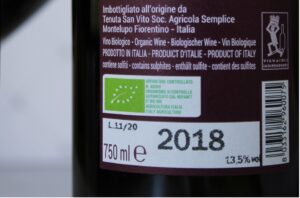Green is the new black – Sustainability in wine (3/3)
For the final section of the paper, WSET wanted us to look at the relationship consumers have with sustainability: does sustainability benefit the consumer, and to what extent does it influence their behaviour?

Does sustainability benefit the consumer?
True sustainability certainly should benefit consumers, as it balances the interests of people, planet and profit. It affects the air each of us breathes; the water – and wine – we drink; the life we live and the resources available to live it, for us as well as our descendants.
Economic growth has brought many benefits, from reducing poverty to improving human rights and access to education, healthcare, water and sanitation. However, what London-based sustainability researchers Paul Ekins & Dimitri Zenghelis call the ‘grow now, clean up later’ mindset, has long ignored externalities. As they put it rather dramatically: ‘this approach has brought human societies to the brink of catastrophe, putting at serious risk all these benefits and, indeed, the continuance of human civilisation itself’.
We can safely assume that measures that allow us to continue human civilisation, business, trade and food and wine production, benefit consumers in the long run. In the short term, however, prices may go up to reflect the full cost of a product. To be economically sustainable, pricing needs to include those expenses that were previously passed on to other parties or future generations. Although price increases may not feel like a benefit to consumers, fair pricing provides the basis for continued, sustainable production and consumption.
Another – less obvious – benefit is that sustainability success stories give us hope. In these times of negative news, improvements in environmental, social and economic indicators motivate us to go on. One of my favourite scientists in our solar system, professor Hans Rosling, called this ‘factfulness: understanding as a source of mental peace’. He warned against losing hope: ‘when people wrongly believe that nothing is improving, they may conclude that nothing we have tried so far is working and lose confidence in measures that actually work.’
Does sustainability influence consumer behaviour?
Research by consumer research organisation Wine Intelligence reveals that wine consumers care about personalisation, experience, convenience and sustainability. Sustainably produced wines align with ‘ethical consumerism’ and consumers perceive them as innovative, trendy, and offering health benefits.
However, consumption behaviour is not entirely consistent with these positive associations; a phenomenon known as the green attitude-behaviour gap or green purchasing inconsistency. According to White et al.: ‘a frustrating paradox remains at the heart of green business: few consumers who report positive attitudes toward eco-friendly products and services follow through with their wallets’.
In one of the Institute of Masters of Wine’s seminars, wine researcher Juan Park explains this by how our brain uses innate pain and reward systems for purchasing decisions. When consumers consider a purchase, their brain weighs what they get out of it, against what it will cost them. If the perceived rewards outweigh the pain, they are likely to buy. Among wine consumers queried by Wine Intelligence, 55% worry about climate. Yet only 40% were willing to endure more ‘pain’ for sustainable wines, in the form of paying more or giving up convenience. However, when a product aligned with their self-image and beliefs, or it was associated with higher standards and quality (= higher rewards), consumers were more likely to buy. Wine label terms such as ‘natural wine’, ‘organic’, ‘environmentally-friendly’, ‘sustainably-produced’, ‘preservative-free’ or ‘fair-trade’ increased consumers’ willingness to buy; while claims which confused them, such as ‘sulphite-free’, ‘carbon-neutral’, ‘biodynamic’, ‘vegan’ or ‘vegetarian’, had the opposite effect.
All this suggests consumers care about and are influenced by sustainability, providing they understand the rewards. An Italian study confirmed that responses to sustainability claims are heterogenous, but overall, labels addressing environmental aspects increase sales. In addition, consumers are willing to pay a premium for wines produced by companies that respect fair working conditions.
Positive effects of sustainability on consumption behaviour are demonstrated across consumer segments, and most of all with millennials, provided sustainability claims are well defined and prominently displayed. A recent study among South-African consumers showed that especially younger individuals with higher incomes, higher education levels and better knowledge of eco-certification were willing to pay a higher price for sustainably produced and fair-trade wines. For low-income consumers, however, higher prices form a barrier, irrespective of their attitudes towards environmentalism.

To summarise and conclude…
When wine businesses want to improve their environmental, social or economic sustainability, it is essential they make an in-depth analysis of the current situation, which highlights where gains can be achieved. In decisions to lower a winery’s environmental impact, the full lifecycle of technologies and measures should be considered. Furthermore, by raising awareness, improving working conditions and involving employees in all sections of the winery, more hands and minds will be working towards achieving the sustainability objectives. And finally, marketing and communication matter. Clear and prominently conveyed sustainability efforts increase a wine’s attractiveness to consumers, boost employee engagement and strengthen the overall brand image and impact. Spread the word to your customers!
Thank you Kristel !
This article is based on the July 2022 D6 paper Kristel Balcaen DipWSET submitted. Read it here.
Kristel passed this paper with distinction, a mark that few achieve for this unit within the WSET Diploma course.










